人教版英语八年级下册Unit 9 Have you ever been to a museum?复习课件82PPT
文档属性
| 名称 | 人教版英语八年级下册Unit 9 Have you ever been to a museum?复习课件82PPT |
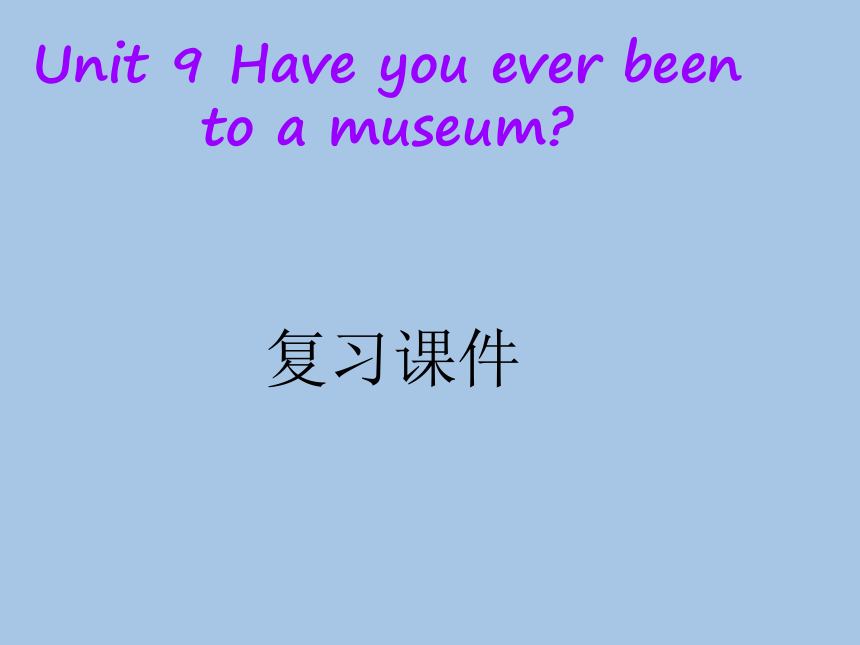
|
|
| 格式 | ppt | ||
| 文件大小 | 2.5MB | ||
| 资源类型 | 教案 | ||
| 版本资源 | 人教新目标(Go for it)版 | ||
| 科目 | 英语 | ||
| 更新时间 | 2020-06-11 00:00:00 | ||
图片预览

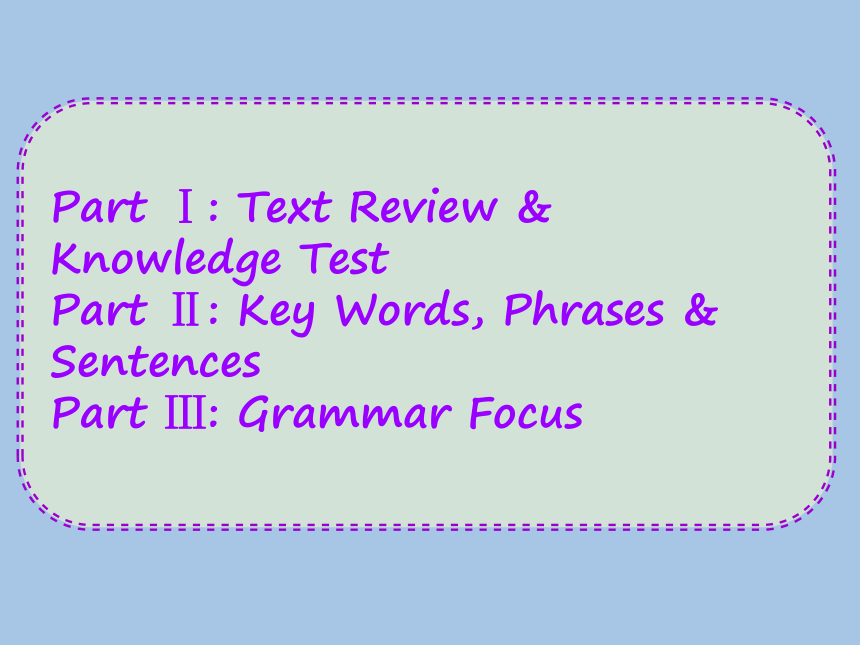
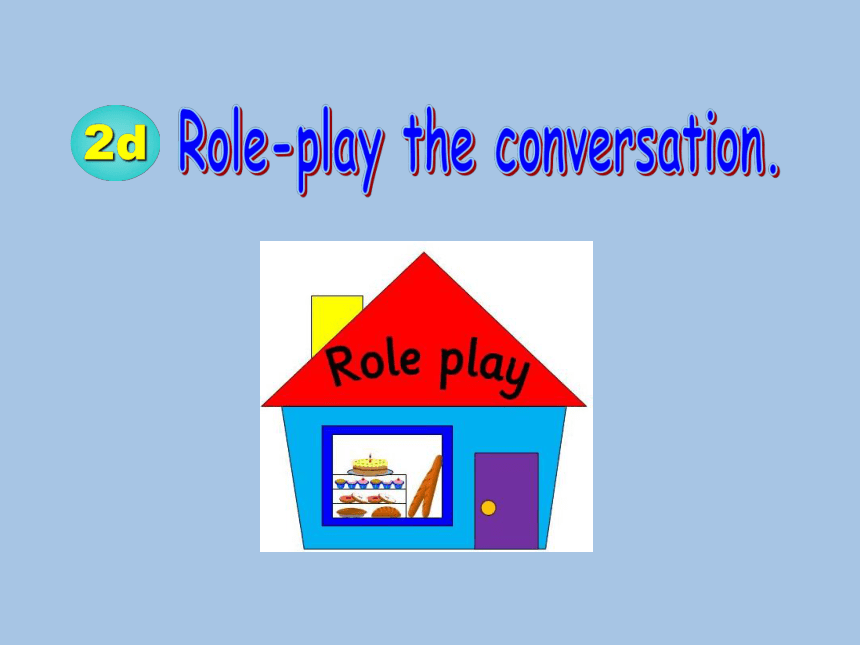
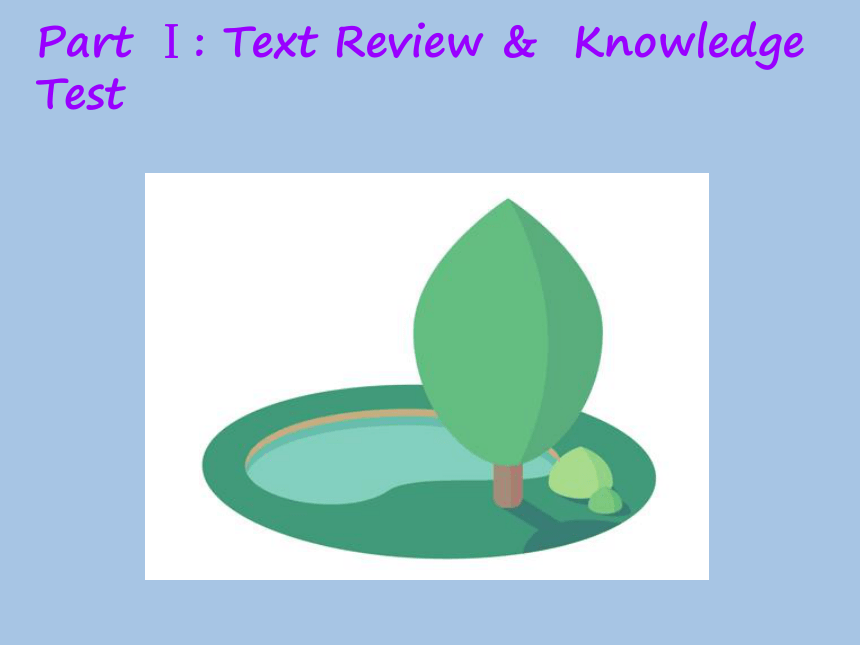
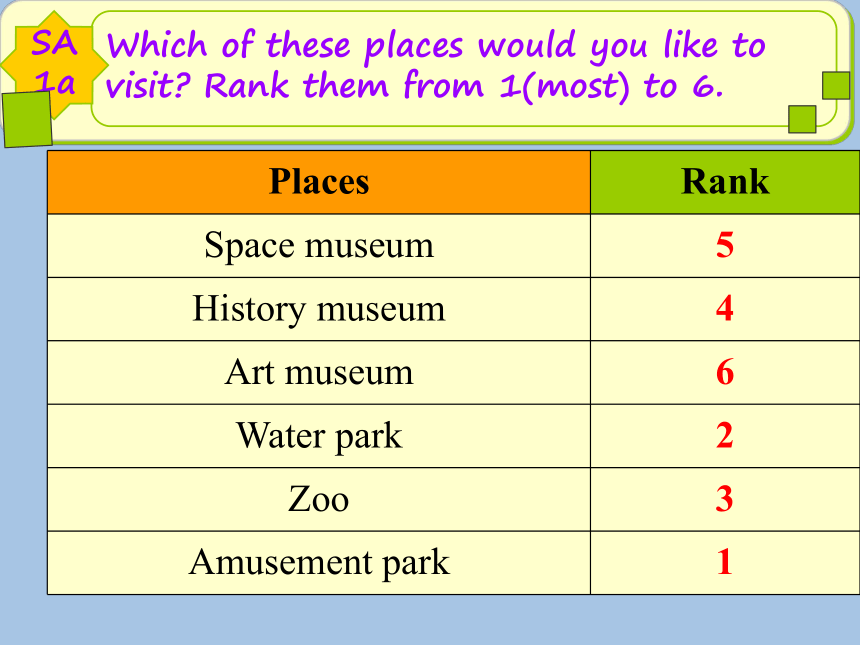
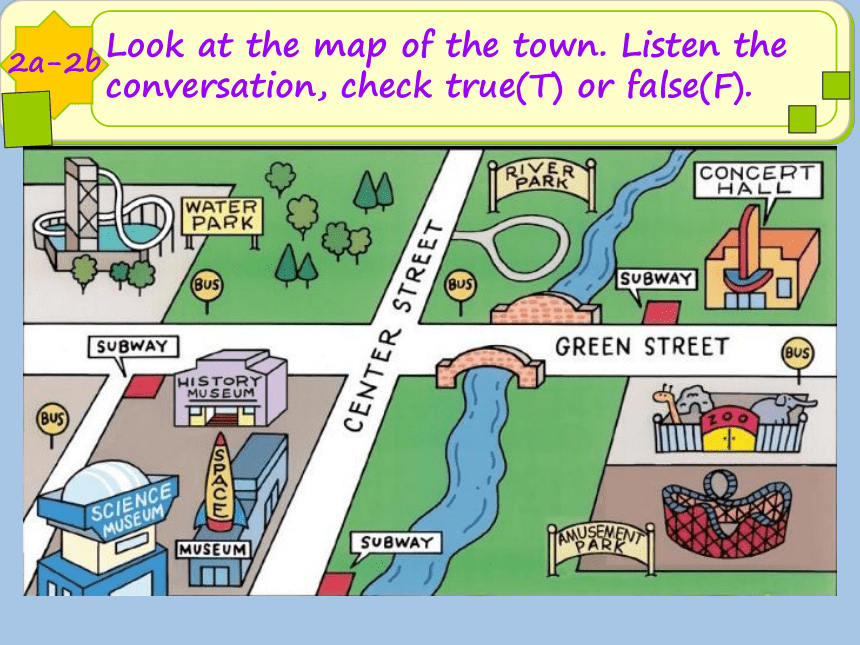
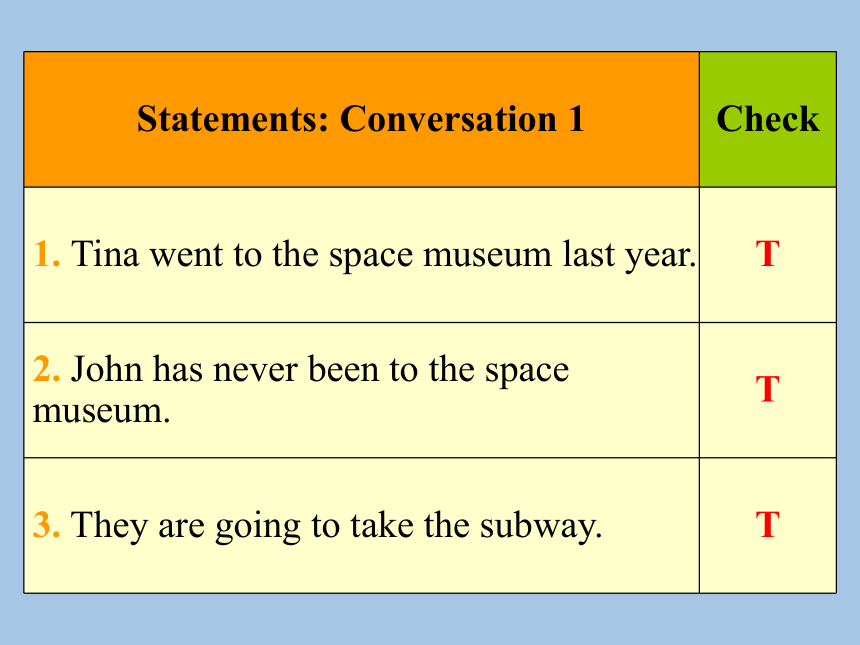
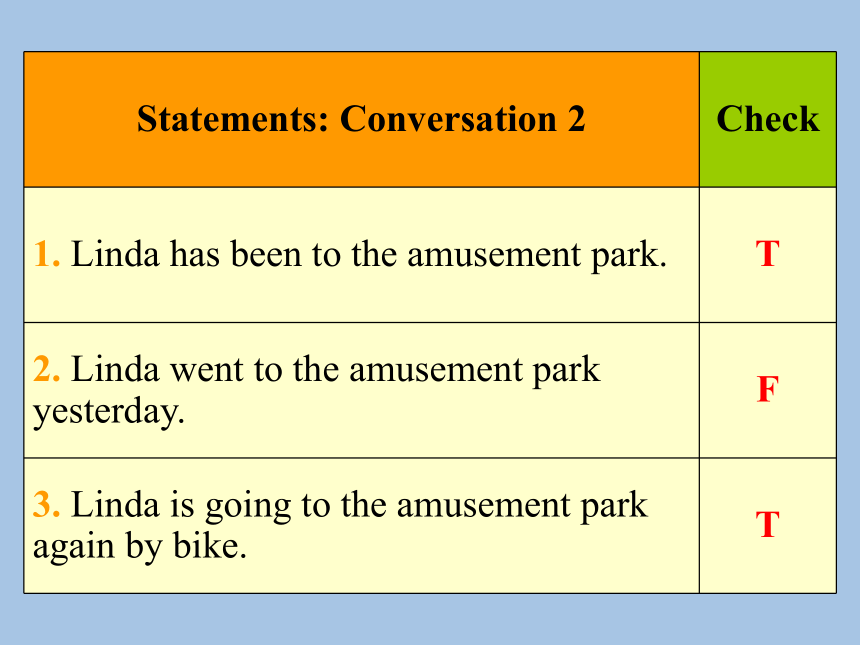
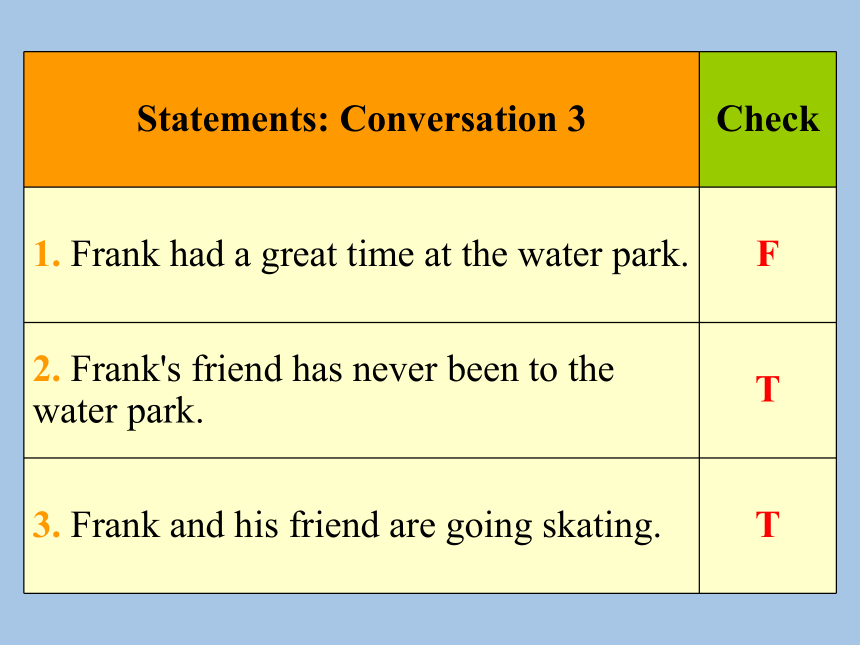
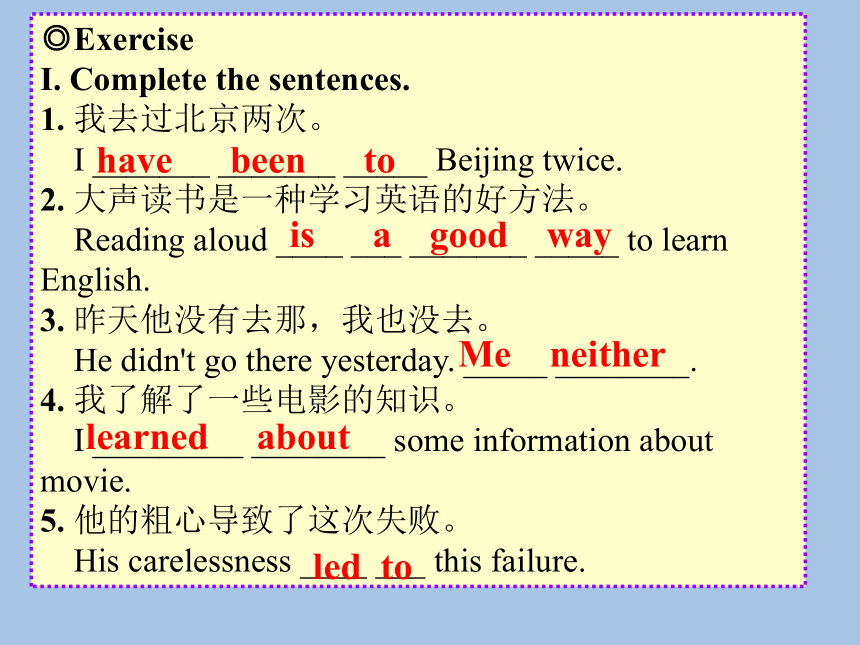
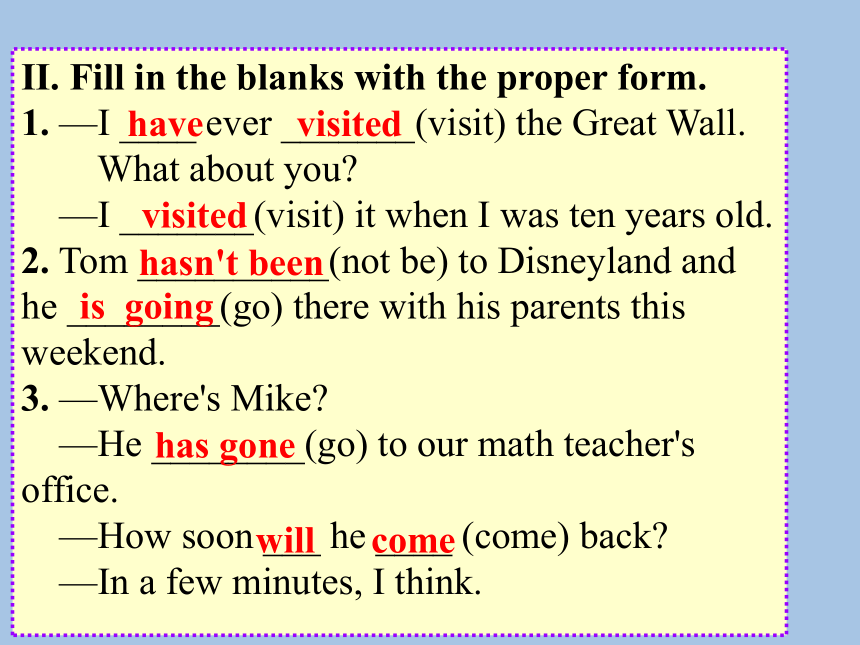
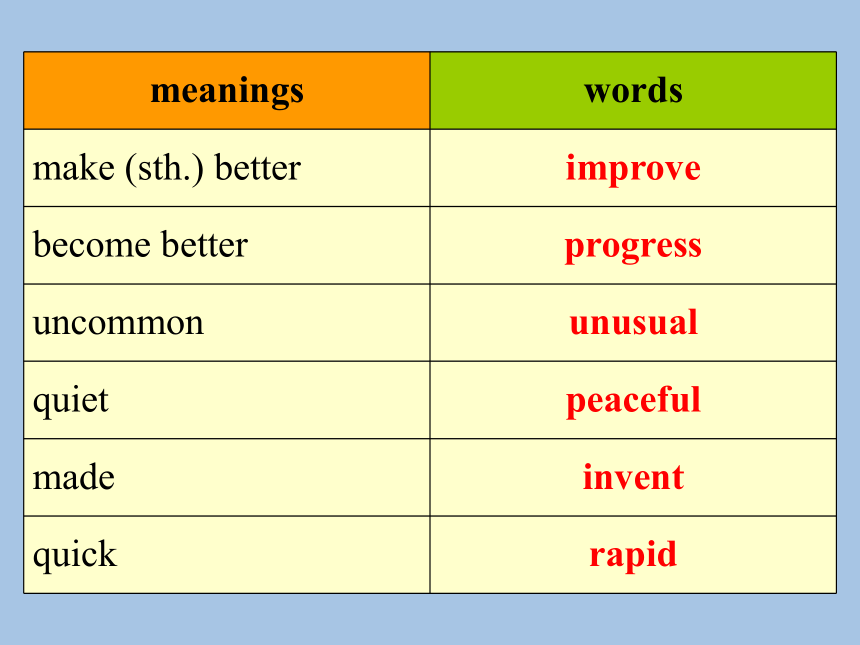
文档简介
(共75张PPT)
Unit 9 Have you ever been
to a museum
复习课件
Part Ⅰ: Text Review & Knowledge Test
Part Ⅱ: Key Words, Phrases & Sentences
Part Ⅲ: Grammar Focus
2d
Part Ⅰ: Text Review & Knowledge Test
Places Rank
Space museum 5
History museum 4
Art museum 6
Water park 2
Zoo 3
Amusement park 1
Which of these places would you like to visit Rank them from 1(most) to 6.
SA
1a
Look at the map of the town. Listen the conversation, check true(T) or false(F).
2a-2b
Statements: Conversation 1 Check
1. Tina went to the space museum last year. T
2. John has never been to the space museum. T
3. They are going to take the subway. T
Statements: Conversation 2 Check
1. Linda has been to the amusement park. T
2. Linda went to the amusement park yesterday. F
3. Linda is going to the amusement park again by bike. T
Statements: Conversation 3 Check
1. Frank had a great time at the water park. F
2. Frank's friend has never been to the water park. T
3. Frank and his friend are going skating. T
◎Exercise
Ⅰ. Complete the sentences.
1. 我去过北京两次。
I _______ _______ _____ Beijing twice.
2. 大声读书是一种学习英语的好方法。
Reading aloud ____ ___ _______ _____ to learn English.
3. 昨天他没有去那,我也没去。
He didn't go there yesterday. _____ ________.
4. 我了解了一些电影的知识。
I _________ ________ some information about movie.
5. 他的粗心导致了这次失败。
His carelessness ____ ___ this failure.
learned about
led to
have been to
is a good way
Me neither
Ⅱ. Fill in the blanks with the proper form.
1. —I ____ ever _______(visit) the Great Wall.
What about you
—I _______(visit) it when I was ten years old.
2. Tom __________(not be) to Disneyland and he ________(go) there with his parents this weekend.
3. —Where's Mike
—He ________(go) to our math teacher's office.
—How soon ___ he ____ (come) back
—In a few minutes, I think.
have
visited
visited
hasn't been
is going
has gone
will
come
meanings words
make (sth.) better improve
become better progress
uncommon unusual
quiet peaceful
made invent
quick rapid
◎Reading Extention
Disneyland
Walt Disney Parks and Resorts or Disney Parks, is one of The Walt Disney Company's four major business segments and a subsidiary.
It is responsible for the conception, building, and managing of the company's theme parks and vacation resorts, as well as a variety of additional family-oriented leisure enterprises. In 2014, the company's theme parks hosted approximately 134 million guests, making Disney Parks the world's most visited theme park company.
◎Exercise
Ⅰ. Choose the best answer from the given choices.
1. —I'd like you to tell me something about the
Disneyland.
—I'm sorry, but neither Jack nor I ___ there.
A. have been B. had been C. have gone D. has gone
2. Miss Green isn't in the office. She ___ to the library.
A.has gone B. went
C.will go D. has been
A
A
3. Julie's father ___ to London last month. He ___
there three times.
A. went; had gone B. has gone; has been
C. went; has been D. has been; had gone
4. He has ___ been to Shanghai, has he
A. already B. never C. ever D. still
5. —These farmers have been to the United States.
—Really When ___ there
A. will they go B. did they go
C. do they go D. have they gone
C
B
B
Ⅱ. Fill in the blanks according to the tips.
1. Has Shirley ever been to an a__________ park
2. It was Christopher Columbus who first d________ American continent.
3. I like fruits, e________ sweet fruits, like
watermelon and litchi.
4. My sister has never been to a water park.
N______ have I.
5. Disneyland resort a______ people from different countries every year.
6. The United Kingdom, the United States and
Australia are all E______________ countries.
musement
iscovered
specially
either
ttracts
nglish-speaking
Names Pictures
the Terracotta Army c
the Great Wall a
the Bird's Nest d
the Palace Museum b
Match the pictures with names.
SB
1a
a
b
c
d
◎Exercise
Choose the best answer from the given choices.
1. Linda ___ the space museum after school yesterday.
A. has been to B. was going to C. went to
2. You don't need to describe her. I ___ her several times.
A. meet B. will meet C. have met
3. Have you ___ heard of Disneyland
A. always B. ever C. never
4. —___ did you start skating —Five years ago.
A. When B. How long C. How often
C
C
B
A
Read the article and take notes.
2a-2b
Singapore
Made up: main island, 63 small islands
Area: 719.1 km2
Population: 5,535,000
(Chinese 76.2%, Malays 13.8%, Indians 8.3%, Others 1.7%)
Items Information
Location in Southeast Asia
Languages Putonghua, English
Food Chinese food, Indian food, western food, Japanese food
Night zoo Night Safari
Temperature almost the same all year round
◎Exercise
Translation
1. 在东南_______________________________
2. 另一方_______________________________
3. 在白_________________________________
4.醒来 ___________________________
5. 终年_______________________________
on the one hand
in southeast Asia
during the daytime
wake up
all year round
Think about your hometown or a place you have been to. Then write an article to advertise or describe it.
3a-3b
*Sentences pattern
Have you ever tried/seen/been...
If you..., you will/can...
You should...
One great thing about...is...
Items Information
Size & location Australia's southeast coast
Population more than four million
Weather coldest in Jul., warmest in Jan.
History 1788, British colony in Australia
Places Sydney Opera House, Sydney Aquarium, Bondi Beach, Greater Blue Mountains Area
Food all kinds of food around the world
Have you ever been to Sydney, in Australia Sydney was established in 1788 as the first British colony in Australia. It is the state capital of New South Wales, with a population of more than four million people.
If you go to Sydney, you can visit the famous Sydney Opera House, and maybe watch a performance there. You should also pay a visit to Bondi Beach, Australia's most famous beach. Have you ever seen a shark feeding up close If you visit the Sydney Aquarium, you won't miss it. As well as the Greater Blue Mountains Area.
One great thing about Sydney is that you can enjoy yourself, because of many different kinds of food all over the world, the pleasant weather. It has four seasons. Its coldest month is usually July, and its warmest month is usually January.
No matter which season you choose to go in, there will always be fun and exciting activities for you!
◎Exercise
Ⅰ. Fill in the blanks according to the give tips.
1. It is s___ to wait in the room.
2. What we need is s_____(仅仅) money, money and money.
3. I f___(害怕) I'm late now.
4. I want to ask _______(是否) she will help.
5. Leave w_______you are ready.
6. She uses her car ______(主要地) for driving to work.
afe
imply
ear
whether
henever
mostly
Ⅱ. Fill in the blanks with the proper form.
1. He ___ ever ____(be) to the History Museum several times.
2. —_____ you ever ____(be) to the zoo
—Yes. I ____(go) there last summer. I ___(see)
many kinds of animals there.
3. —Where is Mr. Wang
—He _________(go) to the library. He wants to borrow some books.
4. Rodgers _______(plant) those trees. He ___(do) it the day before yesterday.
has
been
Have
been
went
saw
has gone
planted
did
Ⅲ. Choose the best answer from the given choices.
1. —___ you ever ___ West Lake before
—Yes. I went there last summer.
A. Have; been to
B. Have; gone to
C. Have; been in
2. —Have you ever been to Hangzhou, Lucy
—No, I haven't. What about you
—___.
A. So do I B. Me neither
C. Me, too D. So have I
A
B
3. ___ of the students in our class ___ money for the disabled people these days.
A. Two third; have raised
B. Two thirds; has raised
C. Two three; have raised
D. Two thirds; have raised
4. —Where is Lily
—Oh, don't you know she ___ to Beijing to see
her parents and she'll be back tomorrow
A. has gone B. has been C. had gone
D
A
5. —___ you ever ___ LA, America
—Not yet. I will visit it this summer vacation.
A. Had; gone to B. Have; gone to
C. Had; been to D. Have; been to
6. —Where is John
—He ___ to the library and he ___ there for an hour.
A. has been; has been B. has gone; has been
C. goes; went D. has been; will be
D
B
1. Have you ever been to a science museum
你去过科技博物馆吗
“have been to+地点”意为“曾经去过某地”、现已不在那里,常和just, never, ever等词连用。后也可接次数, 如once, twice, three times等, 表示“去过某地几次”。
I have been to Mount Huang.
我曾去过黄山。
I have been to Mount Huang twice.
我去过黄山两次。
Part Ⅱ: Key Words, Phrases & Sentences
◎Exercise
1. 你曾去过新图书馆吗
______ you _____ ______ ____ the new library
2. 他去过南京多次了。
He has been to Nanjing _____ _____.
ever been to
Have
many times
2. Me neither. Let's go to one tomorrow.
我也没去过。我们明天去参观一家吧。
(1)neither adv.“也不”,与Me too意思相对。Me neither(=Neither have I),表示前面否定的内容也适合于另一个人或物,表示“两者都不;两者中没有一个”,是both的完全否定形式。常用于句首,此时主语要放在助动词、系动词或情态动词之后。
—Kate hasn't finished her book report yet.
—Me neither./Neither have I.
——凯特还没完成她的读书报告。
——我也没完成。
(2)neither引起的倒装句
a. Neither+auxil. v./link v./modal v.+S。
neither表示后者与前者情形相同(“也不”),意为“也没有……;也不……”,neither引起完全倒装。这种用法和so在完全倒装句中表示“也……”的用法相对应。
b. So+auxil. v./link v./modal v.+S。
如果表示后者与前者情形相同(“也……”),so引起倒装句。
◎Notice
a. So+auxil. v.+S“也……”,完全倒装
b. So+S+auxil. v.“确实如此”,不完全倒装
①I'm not tall. Neither is she.=
I'm not tall. She's not tall, either.
我个子不高, 她个子也不高。
②Mary has gone to Singapore. So has Bob.
玛丽去新加坡了,鲍勃也去了。
③—Mike likes spicy food.
—So he does.
——迈克喜欢吃辣的食物。
——是的,确实如此。
◎Contrast: both/either/neither
a. both意为“两者都”,一般用于肯定的陈述句。与of连用作主语时,其后谓语动词用复数形式;作定语时,其后常跟名词的复数形式。
b. either意为“两者之一;两者中任一个”。用作主语时,其后谓语动词用单数形式;用作定语时,只修饰可数名词的单数形式。还可以用于否定句中表示“也”,这种用法与肯定句中的too相对应。
c. neither意为“两者都不;两者中任何一个也不”,表示全部否定。作pron.,可单独使用,也常与of连用, 即neither of作主语,谓语动词用单数。作adj., 只修饰可数名词的单数形式且置于名词前,谓语动词用单数。作conj., 常用于“neither...nor...”,连接并列成分,意为“既不……也不……”;当连接并列主语时遵循就近原则。
①My sister has never been abroad. I haven't, either.
我姐姐没出过国,我也没有。
②Neither my sister or I have ever been abroad.
我和我姐姐都没出过国。
③I like neither of them.
两个我都不喜欢。
④Neither answer is right.
两个答案都不对。
⑤The street is neither quiet nor clean.
这条街道既不安静也不干净。
◎Practice
1. 父母都不关心这孩子。
_______ parent cares what happens to the child.
2. ——我从没去过美国。
——我也没有。
—I have never been to America.
—____ ______.
3. Neither he nor I ____(have/has) met such a beautiful girl before.
Neither
Me neither
have
4. —I haven't been to Sanya, how about you
—___
A. Me too. B. Me neither.
C. Me also. D. Me haven't.
5. —Did you see Peter and Mike
—No, I saw ___ of them.
A. neither B. either C. both D. none
B
A
3. It's unbelievable that technology has progressed in such a rapid way.
令人难以置信的是,科学技术已取得了如此迅速的发展。
progress u.n.进步;进展
vi.=make progress
progress in sth.=make progress in sth.
在某方面取得进步
Mary has progressed in Chinese.=Mary has made progress in Chinese.玛丽汉语有进步。
◎Practice
1. 这项工作进展迅速。
The work is __________ rapidly.
2. 最近我英语进步很大。
I have _____ _______ ___________ in English recently.
progressing
made great progress
4. It also encourages governments and social groups to think about ways to improve toilets in the future.
它还鼓励政府和社会团体想办法改善未来的厕所。
encourage vt.鼓励;鼓舞;激发;
怂恿;支持;劝告
encourage sb. (to do sth.)鼓励某人(做某事)
(*不定式作宾补)
encourage doing sth.
Mary encouraged me to apply for the job.
玛丽鼓励我去报名应聘那份工作。
Mr. Wang often encourages reading aloud.
王老师常常要求放声朗读。
◎Practice
1. The teachers always encourage him ___ hard.
A. study B. studies C. to study D. studying
2. 他的话鼓舞了我。
His words ___________ ____.
encouraged me
C
5. Have you tried Chinese food
你品尝过中国食品吗
try vt.品尝;尝。后接名词作宾语。
I have tried Sichuan food before.
我以前品尝过四川菜。
◎Contrast
(1)try to do sth.“试图做……”,强调付出努力, 但不一定成功。
(2)try doing sth.“尝试做;做……试试”,含有“看结果如何”之意。
(3)have a try“试一试”(try c.n.尝试;努力)
Please try to finish this work in thirty minutes.
请尽量在30分钟内完成这项工作。
Why didn't you try riding a bike to go to school
你为什么不试着骑自行车去学校呢
He had three tries at climbing the mountain and gave up.
他试着登了三次山以后,最终放弃了。
◎Practice
1. —Have you ___ these cakes
—Yes, very sweet.
A. tried to eat B. tried eating
C. had a try D. tried
2. 请尽量解决这个问题。我们需要你的答案。
Please _____ _____ ________ out the problem. We need your answer.
D
try to work
6. I learned about the inventions that led to color movies, too.
我还了解了一些发明,它们成就了彩色电影。
learn v.了解;获知;得知。由介词about或of引入所获知的具体内容。
The children were all shocked to learn of the
death of their headmaster.
得知校长去世,孩子们都十分震惊。
7. It might seem strange to go to…
去……似乎很奇怪!
seem v.好像;似乎。其后加adj.。
He seems very down today.
他今天好像心情非常沮丧。
She seems anxious because of tomorrow's test.
她似乎因为明天的测试而焦虑不安。
◎Extention
(1)seem+(to be)+n. (2)seem +(to be)+prep.
(3)seem to do sth. (4)It seems that+clause
①They seem (to be) the criminals wanted.
他们好像是被通缉的犯罪分子。
②It seems like years since I last meet you.
自从上次与你邂逅, 似乎已时隔多年。
③She seemed to know the truth.
她似乎知道事情的真相了。
④It seems that it is going to rain.=
It seems (to be) rainy.
天好像要下雨。
8. I've never been camping.
我从未野营过。
*说话人使用这一时态来强调自己至今从未有过野营的经历,欠缺这方面的经验。
现在完成进行时:have been+Present Participle,表示从过去某一时刻一直延续至今的动作。
He's been watching TV all afternoon.
他一下午都在看电视。
We've been living like this ever since the birth
of my little brother.
自打我小弟弟出生,我们就一直这样生活。
9. It's unbelievable that technology has progressed in such a rapid way.科技发展如此迅猛,真是不可思议。
rapid adj.快速的;飞快的。它表达“发生或做得极快,用时短暂”,与fast, quick同为近义词,但更加正式。经常与rapid搭配使用的名词有change, decline, development, growth, improvement, increase, progress, rise等。
◎Notice: rapid的使用,最常见的是用于描述事物和环境变化的短时和快速。
In recent years, China's economy has made a rapid progress.
近年来,中国经济取得了飞快发展。
10. Watching the tea preparation is just as enjoy-able as drinking the tea itself.
看沏茶的过程和饮茶本身一样令人愉快。
-able是一个典型的形容词后缀,可加在动词之后,表示“可……的;能够……的”
enjoyable adj.能使人快乐的;令人愉快的
drinkable adj.可饮用的
readable adj.可读的
washable adj.可洗的
usable adj.可用的;可使用的
11. The tea art performances show how to make a perfect cup of tea with beautiful tea sets.
a perfect cup of tea一杯好茶;一杯完美的茶水
当表示“量”的结构有描述性修饰时,习惯将形容词置于表量名词(unit word)之前。
an easy piece of homework一份简单的作业
a good cup of coffee一杯好咖啡
12. ...Singapore is an English-speaking country。
新加坡是一个说英语的国家。
English-speaking adj.说英语的;英语为母语的;使用英语的。由 English和speaking两个词组成,这是英语中一种常见的形容词构词形式,即:n.+v.-ing。
grass-eating animals食草动物
an apple-picking trip一次采摘苹果之旅
a heart-warming story about a boy who saved his mother's life
一个有关男孩救母的暖人心扉的故事
13. Maybe you fear that you won't be able to find anything good to eat when you travel.
或许你会害怕旅行时找不到好的东西吃。
fear vt.害怕;惧怕。后跟that引导的宾语从句。
◎Extention: collocation of fear
(1)fear to do sth.害怕做某事。
(2)fear for sb./sth.为……担心;为……担忧
Selina fears that she can't pass English test.
塞莉娜害怕不能通过英语测验。
The girl fears to go out at night.
这个女孩害怕晚上出门。
Police fear for the lost children.
警察为丢失的孩子们担忧。
◎Practice
1. 我们担心我们会在森林里迷路。
We ____ ____we will get lost in the forest.
2. Some students fear ____ _______(speak) in front of the class.
to speak
fear that
14. Things to eat.吃的东西
动词不定式to eat放在它修饰的词后面作定语, 不定式和它所修饰的词things之间是动宾关系。
I have a lot of work to do every day.
我每天都有很多工作要做。
◎Extention
(1)不定式的名词用法:作S、P、O或OC
①To learn English is very important.
学英语是很重要的。
②Our duty is to help young children to grow better.
我们的职责就是帮助孩子们更好地成长。
③I really like to watch NBA.
我真的很喜欢看NBA。
④She told me to keep quiet.
她告诉我保持安静。
(2)不定式的副词用法:作adverbial, 表目的、原因、结果等。
①I come here to study English.
我来这儿是为了学英语。
②I am sorry to hear that.
听到那个我很难过。
◎Practice
1. 图书馆是一个学习的好去处。
The library is a good place ____ ________.
2. She always encourages me _____ _______(read) more books.
to study
to read
Part Ⅲ: Grammar Focus
Prensent Perfect Tense
1. 概念
表示过去发生或已经完成的动作对现在造成的影响或结果。动作或状态一般是延续性的, 因此要用表延续性的动词或表状态的动词。现在完成时常与时间副词already, before, ever, never, several times, yet等连用。*already, just多用于肯定句,ever, yet, never多用于疑问句和否定句。
Have you had your dinner yet
你吃晚饭了吗?
I have never been to the space museum.=
I have not been to the space museum yet.
我还没去过太空博物馆。
2. 句型
(1)肯定式:S+have/has+p.p+O
*has用于第三人称单数,其它人称一律用have
(2)否定式:S+have/has not+O
have not常缩略为haven't
has not常缩略为hasn't
(3)一般疑问式:—Have/Has+S+p.p+O
—Yes, S have/has.
No, S haven't/hasn't.
◎Notice
当have被用在现在完成时态中时,它可以和前面的代名词一起组成缩写形式。
I've been there once before.
我曾经到过那里。
I've just lost my pencil-box.
我刚丢了我的铅笔盒。
3. ever & never
(1)ever“曾经”,用于疑问句或否定句中,置于助动词之后、过去分词之前。
(2)never“从来没有;从不”,表示否定,常与before连用,置于助动词之后、过去分词之前。
Have you ever been abroad
你曾出过国吗? I haven't never been late.
我未曾迟到过。
4. have been in, have been to & have gone to
(1)Have/has been in表示“已经在某地待了多长时间”,常与表示一段时间的状语连用。
(2)have/has been (to)表示“曾经到过某地”,说话人此时不在那,已经回来。侧重指经历。可与just, ever, never等连用。后面可接次数,表示“去过某地几次”。
(3)have/has gone (to)表示某人“已经去某地了”,说话人此时可能在路上或已到那里、不在现场。一般不用第一、第二人称代词作主语。
He has been in Beijing for two years.
他到北京有2年了。
He has been to Beijing.
他曾去过北京。
I've been to Beijing three times.
我去过北京三次。
He has gone to Beijing.
他已经去北京了。
◎Summary
1. have/has been in+地名
在某地住了有多久。
2. have/has been to+地名
去过某地(去过已回来)
3. have/has gone to+地名
去了某地(还没回来)
5. the Present Perfect Tense & the Past Tense
(1)一般过去时只强调过去的动作和事实,不表示和现在的关系;现在完成时强调过去的事情对现在的影响,表示动作与现在的关系
(2)一般过去时通常与表示过去的时间状语连用;现在完成时则不能与表示过去的时间状语连用
(3)一般过去时单纯表示过去的经历;现在完成时表示过去的动作或状态延续到现在并可能持续下去
(4)一般过去时的时间状语有...ago, in1980, in October, just now..., last week, yesterday
现在完成时的时间状语有already, ever, for, just, yet, in past years, never, since
*共同的时间状语有already, before, tonight, this morning/summer
I have seen the film.
我看过这部电影。
I saw the film last month.
我上个月看了这部电影。
◎Practice
Ⅰ. Complete the sentences.
1. I ____________(work) in this city for 7 years.
2. —How long ____ she _____(live) here
—Since she ____(get) a new job here.
3. How many words ____ you ____________(learn) since two years ago
4. My mother ____ never _____(hear) of this man.
5. Tom ________(be) to China twice.
has
have worked
got
have
learned/learnt
has
heard
has been
lived
Ⅱ. Fill in the blanks with the proper form.
1. He ___ ever ____ (be) to the History Museum several times.
2. —Where is Mr. Wang
—He _______ (go) to the library. He wants to
borrow some library books.
3. Rodgers _______(plant) those trees. He ___(do) it the day before yesterday.
4. We ____________(learn) English for more than two years.
5. When he ________(finish) his work, he _______ (ring) me up.
has
been
has gone
did
planted
have learned
finishes
will ring
Ⅲ. Fill in the blanks with have gone to, have been to or have been in, using their proper form.
1. —Where's Jim
—He _________ Guilin.
2. She _________ the park, she'll be back in two hours.
3. We have ______ the bookshop and bought many books.
4. My father _________ Beijing twice.
5. My parents __________ Shandong for 10 years.
has gone to
has gone to
been to
has been to
have been in
◎To choose time is to save time.
◎That's all for today!
Unit 9 Have you ever been
to a museum
复习课件
Part Ⅰ: Text Review & Knowledge Test
Part Ⅱ: Key Words, Phrases & Sentences
Part Ⅲ: Grammar Focus
2d
Part Ⅰ: Text Review & Knowledge Test
Places Rank
Space museum 5
History museum 4
Art museum 6
Water park 2
Zoo 3
Amusement park 1
Which of these places would you like to visit Rank them from 1(most) to 6.
SA
1a
Look at the map of the town. Listen the conversation, check true(T) or false(F).
2a-2b
Statements: Conversation 1 Check
1. Tina went to the space museum last year. T
2. John has never been to the space museum. T
3. They are going to take the subway. T
Statements: Conversation 2 Check
1. Linda has been to the amusement park. T
2. Linda went to the amusement park yesterday. F
3. Linda is going to the amusement park again by bike. T
Statements: Conversation 3 Check
1. Frank had a great time at the water park. F
2. Frank's friend has never been to the water park. T
3. Frank and his friend are going skating. T
◎Exercise
Ⅰ. Complete the sentences.
1. 我去过北京两次。
I _______ _______ _____ Beijing twice.
2. 大声读书是一种学习英语的好方法。
Reading aloud ____ ___ _______ _____ to learn English.
3. 昨天他没有去那,我也没去。
He didn't go there yesterday. _____ ________.
4. 我了解了一些电影的知识。
I _________ ________ some information about movie.
5. 他的粗心导致了这次失败。
His carelessness ____ ___ this failure.
learned about
led to
have been to
is a good way
Me neither
Ⅱ. Fill in the blanks with the proper form.
1. —I ____ ever _______(visit) the Great Wall.
What about you
—I _______(visit) it when I was ten years old.
2. Tom __________(not be) to Disneyland and he ________(go) there with his parents this weekend.
3. —Where's Mike
—He ________(go) to our math teacher's office.
—How soon ___ he ____ (come) back
—In a few minutes, I think.
have
visited
visited
hasn't been
is going
has gone
will
come
meanings words
make (sth.) better improve
become better progress
uncommon unusual
quiet peaceful
made invent
quick rapid
◎Reading Extention
Disneyland
Walt Disney Parks and Resorts or Disney Parks, is one of The Walt Disney Company's four major business segments and a subsidiary.
It is responsible for the conception, building, and managing of the company's theme parks and vacation resorts, as well as a variety of additional family-oriented leisure enterprises. In 2014, the company's theme parks hosted approximately 134 million guests, making Disney Parks the world's most visited theme park company.
◎Exercise
Ⅰ. Choose the best answer from the given choices.
1. —I'd like you to tell me something about the
Disneyland.
—I'm sorry, but neither Jack nor I ___ there.
A. have been B. had been C. have gone D. has gone
2. Miss Green isn't in the office. She ___ to the library.
A.has gone B. went
C.will go D. has been
A
A
3. Julie's father ___ to London last month. He ___
there three times.
A. went; had gone B. has gone; has been
C. went; has been D. has been; had gone
4. He has ___ been to Shanghai, has he
A. already B. never C. ever D. still
5. —These farmers have been to the United States.
—Really When ___ there
A. will they go B. did they go
C. do they go D. have they gone
C
B
B
Ⅱ. Fill in the blanks according to the tips.
1. Has Shirley ever been to an a__________ park
2. It was Christopher Columbus who first d________ American continent.
3. I like fruits, e________ sweet fruits, like
watermelon and litchi.
4. My sister has never been to a water park.
N______ have I.
5. Disneyland resort a______ people from different countries every year.
6. The United Kingdom, the United States and
Australia are all E______________ countries.
musement
iscovered
specially
either
ttracts
nglish-speaking
Names Pictures
the Terracotta Army c
the Great Wall a
the Bird's Nest d
the Palace Museum b
Match the pictures with names.
SB
1a
a
b
c
d
◎Exercise
Choose the best answer from the given choices.
1. Linda ___ the space museum after school yesterday.
A. has been to B. was going to C. went to
2. You don't need to describe her. I ___ her several times.
A. meet B. will meet C. have met
3. Have you ___ heard of Disneyland
A. always B. ever C. never
4. —___ did you start skating —Five years ago.
A. When B. How long C. How often
C
C
B
A
Read the article and take notes.
2a-2b
Singapore
Made up: main island, 63 small islands
Area: 719.1 km2
Population: 5,535,000
(Chinese 76.2%, Malays 13.8%, Indians 8.3%, Others 1.7%)
Items Information
Location in Southeast Asia
Languages Putonghua, English
Food Chinese food, Indian food, western food, Japanese food
Night zoo Night Safari
Temperature almost the same all year round
◎Exercise
Translation
1. 在东南_______________________________
2. 另一方_______________________________
3. 在白_________________________________
4.醒来 ___________________________
5. 终年_______________________________
on the one hand
in southeast Asia
during the daytime
wake up
all year round
Think about your hometown or a place you have been to. Then write an article to advertise or describe it.
3a-3b
*Sentences pattern
Have you ever tried/seen/been...
If you..., you will/can...
You should...
One great thing about...is...
Items Information
Size & location Australia's southeast coast
Population more than four million
Weather coldest in Jul., warmest in Jan.
History 1788, British colony in Australia
Places Sydney Opera House, Sydney Aquarium, Bondi Beach, Greater Blue Mountains Area
Food all kinds of food around the world
Have you ever been to Sydney, in Australia Sydney was established in 1788 as the first British colony in Australia. It is the state capital of New South Wales, with a population of more than four million people.
If you go to Sydney, you can visit the famous Sydney Opera House, and maybe watch a performance there. You should also pay a visit to Bondi Beach, Australia's most famous beach. Have you ever seen a shark feeding up close If you visit the Sydney Aquarium, you won't miss it. As well as the Greater Blue Mountains Area.
One great thing about Sydney is that you can enjoy yourself, because of many different kinds of food all over the world, the pleasant weather. It has four seasons. Its coldest month is usually July, and its warmest month is usually January.
No matter which season you choose to go in, there will always be fun and exciting activities for you!
◎Exercise
Ⅰ. Fill in the blanks according to the give tips.
1. It is s___ to wait in the room.
2. What we need is s_____(仅仅) money, money and money.
3. I f___(害怕) I'm late now.
4. I want to ask _______(是否) she will help.
5. Leave w_______you are ready.
6. She uses her car ______(主要地) for driving to work.
afe
imply
ear
whether
henever
mostly
Ⅱ. Fill in the blanks with the proper form.
1. He ___ ever ____(be) to the History Museum several times.
2. —_____ you ever ____(be) to the zoo
—Yes. I ____(go) there last summer. I ___(see)
many kinds of animals there.
3. —Where is Mr. Wang
—He _________(go) to the library. He wants to borrow some books.
4. Rodgers _______(plant) those trees. He ___(do) it the day before yesterday.
has
been
Have
been
went
saw
has gone
planted
did
Ⅲ. Choose the best answer from the given choices.
1. —___ you ever ___ West Lake before
—Yes. I went there last summer.
A. Have; been to
B. Have; gone to
C. Have; been in
2. —Have you ever been to Hangzhou, Lucy
—No, I haven't. What about you
—___.
A. So do I B. Me neither
C. Me, too D. So have I
A
B
3. ___ of the students in our class ___ money for the disabled people these days.
A. Two third; have raised
B. Two thirds; has raised
C. Two three; have raised
D. Two thirds; have raised
4. —Where is Lily
—Oh, don't you know she ___ to Beijing to see
her parents and she'll be back tomorrow
A. has gone B. has been C. had gone
D
A
5. —___ you ever ___ LA, America
—Not yet. I will visit it this summer vacation.
A. Had; gone to B. Have; gone to
C. Had; been to D. Have; been to
6. —Where is John
—He ___ to the library and he ___ there for an hour.
A. has been; has been B. has gone; has been
C. goes; went D. has been; will be
D
B
1. Have you ever been to a science museum
你去过科技博物馆吗
“have been to+地点”意为“曾经去过某地”、现已不在那里,常和just, never, ever等词连用。后也可接次数, 如once, twice, three times等, 表示“去过某地几次”。
I have been to Mount Huang.
我曾去过黄山。
I have been to Mount Huang twice.
我去过黄山两次。
Part Ⅱ: Key Words, Phrases & Sentences
◎Exercise
1. 你曾去过新图书馆吗
______ you _____ ______ ____ the new library
2. 他去过南京多次了。
He has been to Nanjing _____ _____.
ever been to
Have
many times
2. Me neither. Let's go to one tomorrow.
我也没去过。我们明天去参观一家吧。
(1)neither adv.“也不”,与Me too意思相对。Me neither(=Neither have I),表示前面否定的内容也适合于另一个人或物,表示“两者都不;两者中没有一个”,是both的完全否定形式。常用于句首,此时主语要放在助动词、系动词或情态动词之后。
—Kate hasn't finished her book report yet.
—Me neither./Neither have I.
——凯特还没完成她的读书报告。
——我也没完成。
(2)neither引起的倒装句
a. Neither+auxil. v./link v./modal v.+S。
neither表示后者与前者情形相同(“也不”),意为“也没有……;也不……”,neither引起完全倒装。这种用法和so在完全倒装句中表示“也……”的用法相对应。
b. So+auxil. v./link v./modal v.+S。
如果表示后者与前者情形相同(“也……”),so引起倒装句。
◎Notice
a. So+auxil. v.+S“也……”,完全倒装
b. So+S+auxil. v.“确实如此”,不完全倒装
①I'm not tall. Neither is she.=
I'm not tall. She's not tall, either.
我个子不高, 她个子也不高。
②Mary has gone to Singapore. So has Bob.
玛丽去新加坡了,鲍勃也去了。
③—Mike likes spicy food.
—So he does.
——迈克喜欢吃辣的食物。
——是的,确实如此。
◎Contrast: both/either/neither
a. both意为“两者都”,一般用于肯定的陈述句。与of连用作主语时,其后谓语动词用复数形式;作定语时,其后常跟名词的复数形式。
b. either意为“两者之一;两者中任一个”。用作主语时,其后谓语动词用单数形式;用作定语时,只修饰可数名词的单数形式。还可以用于否定句中表示“也”,这种用法与肯定句中的too相对应。
c. neither意为“两者都不;两者中任何一个也不”,表示全部否定。作pron.,可单独使用,也常与of连用, 即neither of作主语,谓语动词用单数。作adj., 只修饰可数名词的单数形式且置于名词前,谓语动词用单数。作conj., 常用于“neither...nor...”,连接并列成分,意为“既不……也不……”;当连接并列主语时遵循就近原则。
①My sister has never been abroad. I haven't, either.
我姐姐没出过国,我也没有。
②Neither my sister or I have ever been abroad.
我和我姐姐都没出过国。
③I like neither of them.
两个我都不喜欢。
④Neither answer is right.
两个答案都不对。
⑤The street is neither quiet nor clean.
这条街道既不安静也不干净。
◎Practice
1. 父母都不关心这孩子。
_______ parent cares what happens to the child.
2. ——我从没去过美国。
——我也没有。
—I have never been to America.
—____ ______.
3. Neither he nor I ____(have/has) met such a beautiful girl before.
Neither
Me neither
have
4. —I haven't been to Sanya, how about you
—___
A. Me too. B. Me neither.
C. Me also. D. Me haven't.
5. —Did you see Peter and Mike
—No, I saw ___ of them.
A. neither B. either C. both D. none
B
A
3. It's unbelievable that technology has progressed in such a rapid way.
令人难以置信的是,科学技术已取得了如此迅速的发展。
progress u.n.进步;进展
vi.=make progress
progress in sth.=make progress in sth.
在某方面取得进步
Mary has progressed in Chinese.=Mary has made progress in Chinese.玛丽汉语有进步。
◎Practice
1. 这项工作进展迅速。
The work is __________ rapidly.
2. 最近我英语进步很大。
I have _____ _______ ___________ in English recently.
progressing
made great progress
4. It also encourages governments and social groups to think about ways to improve toilets in the future.
它还鼓励政府和社会团体想办法改善未来的厕所。
encourage vt.鼓励;鼓舞;激发;
怂恿;支持;劝告
encourage sb. (to do sth.)鼓励某人(做某事)
(*不定式作宾补)
encourage doing sth.
Mary encouraged me to apply for the job.
玛丽鼓励我去报名应聘那份工作。
Mr. Wang often encourages reading aloud.
王老师常常要求放声朗读。
◎Practice
1. The teachers always encourage him ___ hard.
A. study B. studies C. to study D. studying
2. 他的话鼓舞了我。
His words ___________ ____.
encouraged me
C
5. Have you tried Chinese food
你品尝过中国食品吗
try vt.品尝;尝。后接名词作宾语。
I have tried Sichuan food before.
我以前品尝过四川菜。
◎Contrast
(1)try to do sth.“试图做……”,强调付出努力, 但不一定成功。
(2)try doing sth.“尝试做;做……试试”,含有“看结果如何”之意。
(3)have a try“试一试”(try c.n.尝试;努力)
Please try to finish this work in thirty minutes.
请尽量在30分钟内完成这项工作。
Why didn't you try riding a bike to go to school
你为什么不试着骑自行车去学校呢
He had three tries at climbing the mountain and gave up.
他试着登了三次山以后,最终放弃了。
◎Practice
1. —Have you ___ these cakes
—Yes, very sweet.
A. tried to eat B. tried eating
C. had a try D. tried
2. 请尽量解决这个问题。我们需要你的答案。
Please _____ _____ ________ out the problem. We need your answer.
D
try to work
6. I learned about the inventions that led to color movies, too.
我还了解了一些发明,它们成就了彩色电影。
learn v.了解;获知;得知。由介词about或of引入所获知的具体内容。
The children were all shocked to learn of the
death of their headmaster.
得知校长去世,孩子们都十分震惊。
7. It might seem strange to go to…
去……似乎很奇怪!
seem v.好像;似乎。其后加adj.。
He seems very down today.
他今天好像心情非常沮丧。
She seems anxious because of tomorrow's test.
她似乎因为明天的测试而焦虑不安。
◎Extention
(1)seem+(to be)+n. (2)seem +(to be)+prep.
(3)seem to do sth. (4)It seems that+clause
①They seem (to be) the criminals wanted.
他们好像是被通缉的犯罪分子。
②It seems like years since I last meet you.
自从上次与你邂逅, 似乎已时隔多年。
③She seemed to know the truth.
她似乎知道事情的真相了。
④It seems that it is going to rain.=
It seems (to be) rainy.
天好像要下雨。
8. I've never been camping.
我从未野营过。
*说话人使用这一时态来强调自己至今从未有过野营的经历,欠缺这方面的经验。
现在完成进行时:have been+Present Participle,表示从过去某一时刻一直延续至今的动作。
He's been watching TV all afternoon.
他一下午都在看电视。
We've been living like this ever since the birth
of my little brother.
自打我小弟弟出生,我们就一直这样生活。
9. It's unbelievable that technology has progressed in such a rapid way.科技发展如此迅猛,真是不可思议。
rapid adj.快速的;飞快的。它表达“发生或做得极快,用时短暂”,与fast, quick同为近义词,但更加正式。经常与rapid搭配使用的名词有change, decline, development, growth, improvement, increase, progress, rise等。
◎Notice: rapid的使用,最常见的是用于描述事物和环境变化的短时和快速。
In recent years, China's economy has made a rapid progress.
近年来,中国经济取得了飞快发展。
10. Watching the tea preparation is just as enjoy-able as drinking the tea itself.
看沏茶的过程和饮茶本身一样令人愉快。
-able是一个典型的形容词后缀,可加在动词之后,表示“可……的;能够……的”
enjoyable adj.能使人快乐的;令人愉快的
drinkable adj.可饮用的
readable adj.可读的
washable adj.可洗的
usable adj.可用的;可使用的
11. The tea art performances show how to make a perfect cup of tea with beautiful tea sets.
a perfect cup of tea一杯好茶;一杯完美的茶水
当表示“量”的结构有描述性修饰时,习惯将形容词置于表量名词(unit word)之前。
an easy piece of homework一份简单的作业
a good cup of coffee一杯好咖啡
12. ...Singapore is an English-speaking country。
新加坡是一个说英语的国家。
English-speaking adj.说英语的;英语为母语的;使用英语的。由 English和speaking两个词组成,这是英语中一种常见的形容词构词形式,即:n.+v.-ing。
grass-eating animals食草动物
an apple-picking trip一次采摘苹果之旅
a heart-warming story about a boy who saved his mother's life
一个有关男孩救母的暖人心扉的故事
13. Maybe you fear that you won't be able to find anything good to eat when you travel.
或许你会害怕旅行时找不到好的东西吃。
fear vt.害怕;惧怕。后跟that引导的宾语从句。
◎Extention: collocation of fear
(1)fear to do sth.害怕做某事。
(2)fear for sb./sth.为……担心;为……担忧
Selina fears that she can't pass English test.
塞莉娜害怕不能通过英语测验。
The girl fears to go out at night.
这个女孩害怕晚上出门。
Police fear for the lost children.
警察为丢失的孩子们担忧。
◎Practice
1. 我们担心我们会在森林里迷路。
We ____ ____we will get lost in the forest.
2. Some students fear ____ _______(speak) in front of the class.
to speak
fear that
14. Things to eat.吃的东西
动词不定式to eat放在它修饰的词后面作定语, 不定式和它所修饰的词things之间是动宾关系。
I have a lot of work to do every day.
我每天都有很多工作要做。
◎Extention
(1)不定式的名词用法:作S、P、O或OC
①To learn English is very important.
学英语是很重要的。
②Our duty is to help young children to grow better.
我们的职责就是帮助孩子们更好地成长。
③I really like to watch NBA.
我真的很喜欢看NBA。
④She told me to keep quiet.
她告诉我保持安静。
(2)不定式的副词用法:作adverbial, 表目的、原因、结果等。
①I come here to study English.
我来这儿是为了学英语。
②I am sorry to hear that.
听到那个我很难过。
◎Practice
1. 图书馆是一个学习的好去处。
The library is a good place ____ ________.
2. She always encourages me _____ _______(read) more books.
to study
to read
Part Ⅲ: Grammar Focus
Prensent Perfect Tense
1. 概念
表示过去发生或已经完成的动作对现在造成的影响或结果。动作或状态一般是延续性的, 因此要用表延续性的动词或表状态的动词。现在完成时常与时间副词already, before, ever, never, several times, yet等连用。*already, just多用于肯定句,ever, yet, never多用于疑问句和否定句。
Have you had your dinner yet
你吃晚饭了吗?
I have never been to the space museum.=
I have not been to the space museum yet.
我还没去过太空博物馆。
2. 句型
(1)肯定式:S+have/has+p.p+O
*has用于第三人称单数,其它人称一律用have
(2)否定式:S+have/has not+O
have not常缩略为haven't
has not常缩略为hasn't
(3)一般疑问式:—Have/Has+S+p.p+O
—Yes, S have/has.
No, S haven't/hasn't.
◎Notice
当have被用在现在完成时态中时,它可以和前面的代名词一起组成缩写形式。
I've been there once before.
我曾经到过那里。
I've just lost my pencil-box.
我刚丢了我的铅笔盒。
3. ever & never
(1)ever“曾经”,用于疑问句或否定句中,置于助动词之后、过去分词之前。
(2)never“从来没有;从不”,表示否定,常与before连用,置于助动词之后、过去分词之前。
Have you ever been abroad
你曾出过国吗? I haven't never been late.
我未曾迟到过。
4. have been in, have been to & have gone to
(1)Have/has been in表示“已经在某地待了多长时间”,常与表示一段时间的状语连用。
(2)have/has been (to)表示“曾经到过某地”,说话人此时不在那,已经回来。侧重指经历。可与just, ever, never等连用。后面可接次数,表示“去过某地几次”。
(3)have/has gone (to)表示某人“已经去某地了”,说话人此时可能在路上或已到那里、不在现场。一般不用第一、第二人称代词作主语。
He has been in Beijing for two years.
他到北京有2年了。
He has been to Beijing.
他曾去过北京。
I've been to Beijing three times.
我去过北京三次。
He has gone to Beijing.
他已经去北京了。
◎Summary
1. have/has been in+地名
在某地住了有多久。
2. have/has been to+地名
去过某地(去过已回来)
3. have/has gone to+地名
去了某地(还没回来)
5. the Present Perfect Tense & the Past Tense
(1)一般过去时只强调过去的动作和事实,不表示和现在的关系;现在完成时强调过去的事情对现在的影响,表示动作与现在的关系
(2)一般过去时通常与表示过去的时间状语连用;现在完成时则不能与表示过去的时间状语连用
(3)一般过去时单纯表示过去的经历;现在完成时表示过去的动作或状态延续到现在并可能持续下去
(4)一般过去时的时间状语有...ago, in1980, in October, just now..., last week, yesterday
现在完成时的时间状语有already, ever, for, just, yet, in past years, never, since
*共同的时间状语有already, before, tonight, this morning/summer
I have seen the film.
我看过这部电影。
I saw the film last month.
我上个月看了这部电影。
◎Practice
Ⅰ. Complete the sentences.
1. I ____________(work) in this city for 7 years.
2. —How long ____ she _____(live) here
—Since she ____(get) a new job here.
3. How many words ____ you ____________(learn) since two years ago
4. My mother ____ never _____(hear) of this man.
5. Tom ________(be) to China twice.
has
have worked
got
have
learned/learnt
has
heard
has been
lived
Ⅱ. Fill in the blanks with the proper form.
1. He ___ ever ____ (be) to the History Museum several times.
2. —Where is Mr. Wang
—He _______ (go) to the library. He wants to
borrow some library books.
3. Rodgers _______(plant) those trees. He ___(do) it the day before yesterday.
4. We ____________(learn) English for more than two years.
5. When he ________(finish) his work, he _______ (ring) me up.
has
been
has gone
did
planted
have learned
finishes
will ring
Ⅲ. Fill in the blanks with have gone to, have been to or have been in, using their proper form.
1. —Where's Jim
—He _________ Guilin.
2. She _________ the park, she'll be back in two hours.
3. We have ______ the bookshop and bought many books.
4. My father _________ Beijing twice.
5. My parents __________ Shandong for 10 years.
has gone to
has gone to
been to
has been to
have been in
◎To choose time is to save time.
◎That's all for today!
同课章节目录
- Unit 1 What's the matter?
- Section A
- Section B
- Unit 2 I'll help to clean up the city parks.
- Section A
- Section B
- Unit 3 Could you please clean your room?
- Section A
- Section B
- Unit 4 Why don't you talk to your parents?
- Section A
- Section B
- Unit 5 What were you doing when the rainstorm came
- Section A
- Section B
- Review of Units 1-5
- Unit 6 An old man tried to move the mountains.
- Section A
- Section B
- Unit 7 What's the highest mountain in the world?
- Section A
- Section B
- Unit 8 Have you read Treasure Island yet?
- Section A
- Section B
- Unit 9 Have you ever been to a museum?
- Section A
- Section B
- Unit 10 I've had this bike for three years.
- Section A
- Section B
